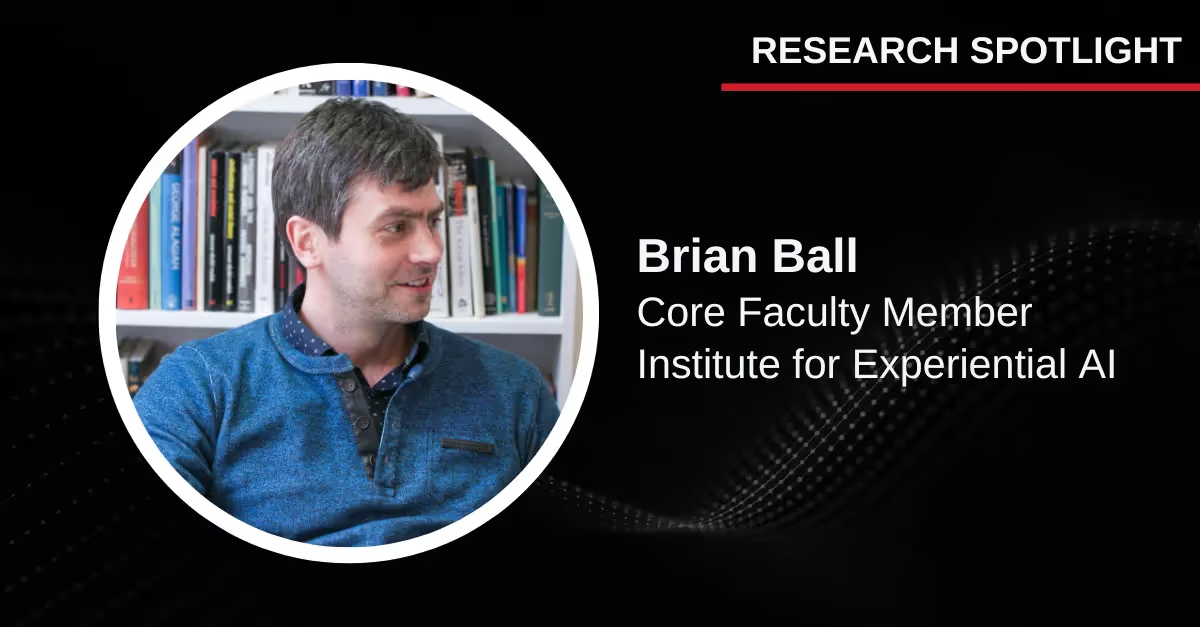Northeastern’s London AI Workshop Series Joins Academic Theory With Industry Problems

Developing an AI strategy that protects against the technology’s many risks can feel a bit like the ancient myth of Hercules slicing off heads of the dragon: As soon as one concern is addressed, another three pop up. That’s why it’s important to include a diverse set of stakeholders in discussions about Responsible AI.
In keeping with that idea, the Institute for Experiential AI’s London-based research group partnered with the engineering and consulting multinational Cognizant to launch the “Conversations on AI” series of events, which aims to bring Institute faculty together with AI industry practitioners, executives, students, lawyers, and more to tackle some today’s thorniest AI problems.
“We see the workshops as an opportunity for real world problem solving,” says Institute core faculty member Brian Ball, an associate professor of philosophy at Northeastern University London. “It’s also a way for us academics to put our research to the test in a practical setting through conversations with practitioners.”
The theme of the first event on Nov. 21 was AI regulation. It prompted participants to evaluate the AI laws and regulations being implemented by governments around the globe and discuss the best path for businesses to responsibly harness the technology.
The next event, taking place Feb. 20, will explore issues at the intersection of AI and sustainability. It will convene a set of leading organizations, industry practitioners, academics, policymakers, and students to explore the best ways to harness AI to enhance environmental sustainability.
Fueling Use-Inspired Research
Each gathering exemplifies Northeastern University’s research approach of going out into the world to let real problems guide research activities.
"Since we started at Northeastern University, it's become clear that experiential learning is key, and I think that applies to research as well,” Ball says. “Researchers are constantly learning just like students, and if we're going to advance our knowledge, it's really useful to not just talk amongst ourselves, but to talk across disciplines and beyond academia.”
The London researchers work as part of the Institute’s Responsible AI team, conducting research, hosting events, and collaborating with the rest of the Institute to help businesses implement AI ethically.
The workshops serve to advance the Institute’s mission of responsibly applying human-centric AI to some of humanity’s most intractable problems.
“Universities are key players in the knowledge economy,” Ball says. “This series and some of our other activities speak directly to the strategic priorities of the Institute. One of those priorities is Responsible AI. With these events, we're trying to address Responsible AI in an experiential way. These workshops are almost like a little lab for us. It's not a controlled experiment, but it allows us to put theory to the test.”
Making Academic Theory Real
The first workshop included four panel discussions followed by breakout sessions that focused on specific questions related to the panel discussion. One session, for example, challenged panelists to contrast the UK’s approach to AI regulation with that of the European Union. Another asked participants to think more broadly about AI regulation in places like the United States and China.
"From an academic perspective, it's very useful to speak to practitioners who are actually working on the front lines and implementing solutions,” says David Freeborn, an assistant professor at Northeastern University London. “If nothing else, just to see how practitioners react to academic ideas, and see how those ideas sound to people actually working in AI, is a great way to judge their practicality. It also helps us build out contacts for dissemination of our work to broaden our impact"
The Feb. 20 workshop will challenge participants to consider how organizations can use AI to achieve sustainability goals. Speakers will include Jenny Edwards, the associate director for sustainability consulting at Cognizant, and Northeastern University London professors Aidan O’Sullivan and Mariana Macedo.
"This theme of sustainability is so important,” Ball says. “So many organizations are trying to navigate how they'll meet their strategic goals on sustainable development right now. It's about seeing how they're implementing sustainability in their organizations and how that interacts with artificial intelligence. It's incredibly exciting."
Click here to attend the next workshop or learn more.

